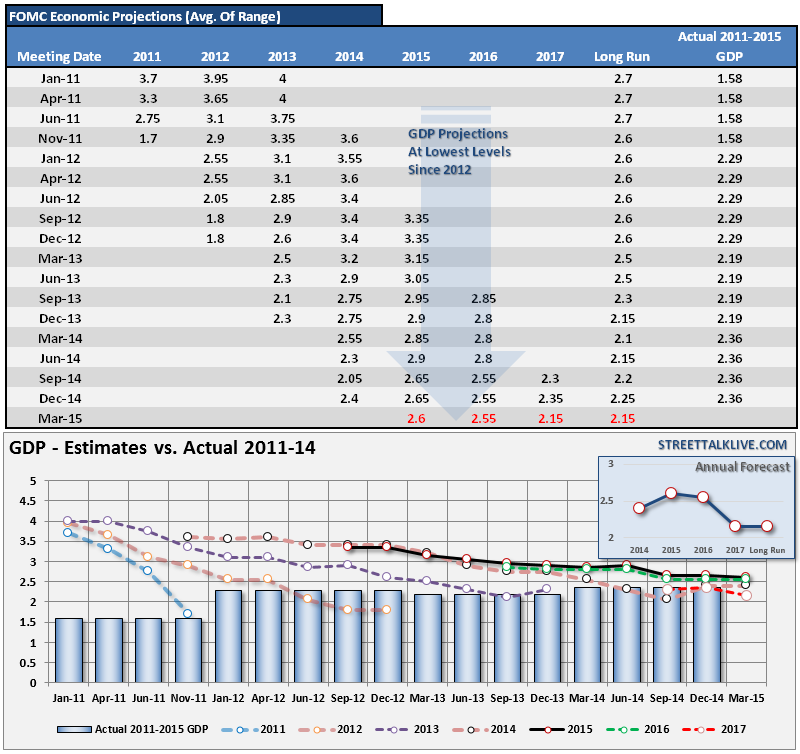Early 2000s: Bush Tax Cuts and Wars
Just as Democrats and centrist Republicans in 1980 predicted economic disaster due to Reagan's voodoo economics, the Democratics in the early 2000s were sure that Bush's Tax Cuts and profligate spending would cause a major economic dislocation. As Paul Krugman put it in 2003:There is now a huge structural gap — that is, a gap that won't go away even if the economy recovers — between U.S. spending and revenue. For the time being, borrowing can fill that gap. But eventually there must be either a large tax increase or major cuts in popular programs. If our political system can't bring itself to choose one alternative or the other — and so far the commander in chief refuses even to admit that we have a problem — we will eventually face a nasty financial crisis.
The crisis won't come immediately. For a few years, America will still be able to borrow freely, simply because lenders assume that things will somehow work out.
But at a certain point we'll have a Wile E. Coyote moment. For those not familiar with the Road Runner cartoons, Mr. Coyote had a habit of running off cliffs and taking several steps on thin air before noticing that there was nothing underneath his feet. Only then would he plunge.
What will that plunge look like? It will certainly involve a sharp fall in the dollar and a sharp rise in interest rates. In the worst-case scenario, the government's access to borrowing will be cut off, creating a cash crisis that throws the nation into chaos.
[Paul Krugman, New York Times, 10/14/2003 http://www.pkarchive.org/column/101403.html ]That turned about to be 180° wrong as Krugman himself acknowledged in 2012:
Fighting Fiscal Phantoms. As I described here, that was a complete turnaround, without ever acknowledging he was wrong in the first place. With Krugman as our economic guru, no wonder so many liberals are confused.
2008: Housing Bubble Leads to Financial Crisis
The leading Democrats, including Barack Obama and Hillary Clinton advisors, were clueless going into the great financial meltdown and recession of 2008. Austan Goolsbee, who was to become Chairman of the Council of Economic Advisers under Obama, praised subprime housing loans in 2007: ‘Irresponsible’ Mortgages Have Opened Doors to Many of the Excluded. Notice the scare quotes around the word irresponsible. My neighborhood in Detroit was one of many devastated by extremely high levels of foreclosures and bank-owned, empty housing Of course, the entire country was plunged into recession and saved from worse only by trillion dollar government bailouts to private financial institutions.
2009: Stimulus Package
The fiscal stimulus passed in 2009 over the objection of almost all Republican Congresspersons. The bill was scaled back considerably to get the support of a few Republicans needed to break a filibuster in the Senate. While this was the probably the best that the Democrats could have accomplished given the political landscape (short of the reconciliation tactic later used to pass ObamaCare), the Democratic leadership never made the case for a more adequate response. Consequently, the Democrats were punished politically, suffering massive defeats in both houses of Congress in the 2010 midterm elections, and losing control of many state governments.2013-2015: Recovery?
As Obama's second term wore on, the leading liberal / Democratic economists began to proclaim recovery. However, it soon had to be acknowledged that the "recovery" corresponded to one of the slowest periods of growth since World War II. Moreover, the recovery was skewed to the wealthy, and wage stagnation has been a fact of life for the middle class. Obama appointed Janet Yellen to take over as head of the Federal Reserve, giving Democrats even greater ownership of the economic status quo.
The following chart (source David Stockman) shows how the Fed has consistently overestimated growth:

Thus, for example, the Fed in January 2011 was predicting 4% growth for 2013. The actual growth, as shown in the Dec-13 row was 2.3% (since revised down again to 1.5%). The same pattern occurs for every year in the table.
2015-2016: Reduced Potential
The liberal / Democratic conventional wisdom has now come to grips with the fact that they've been continually over-optimistic. The result has been to lower expectations as to what is possible. This is shown in the diagram above in the "Long Run" column. The long run growth potential of the economy was thought to be an annual rate of 2.7% in 2011 to a rate of 2.15% in 2015.
Kevin Drum in 2012 claimed that 12 million new jobs is the minimum that should be expected over the next presidential term, and that even Romney would have no trouble hitting that. Now that we're on pace for considerably less than that, he seems to be part of the new consensus that we're doing just fine, given our reduced potential.
Liberal Democrat at Bill McBride (at the popular Calculated Risk blog) says that 2% is the new 4%.
This is nonsense, in my opinion. Bernie Sanders' proposals would put a lot more disposable income into the hands of the lower and middle classses, and they would spend it, thus increasing growth. Perhaps we could get annual growth back to the 5%+ of the voodoo-based Reagan era -- bouncing back from a severe recession, as we are now trying to do.

[ John Ross ]
The combination of dramatically slower growth and "ownership society" benefits does not bode well for the younger amongst us.
The Future
U.S. economic growth has slowed dramatically over the last 50 years:[ John Ross ]
The combination of dramatically slower growth and "ownership society" benefits does not bode well for the younger amongst us.
No comments:
Post a Comment